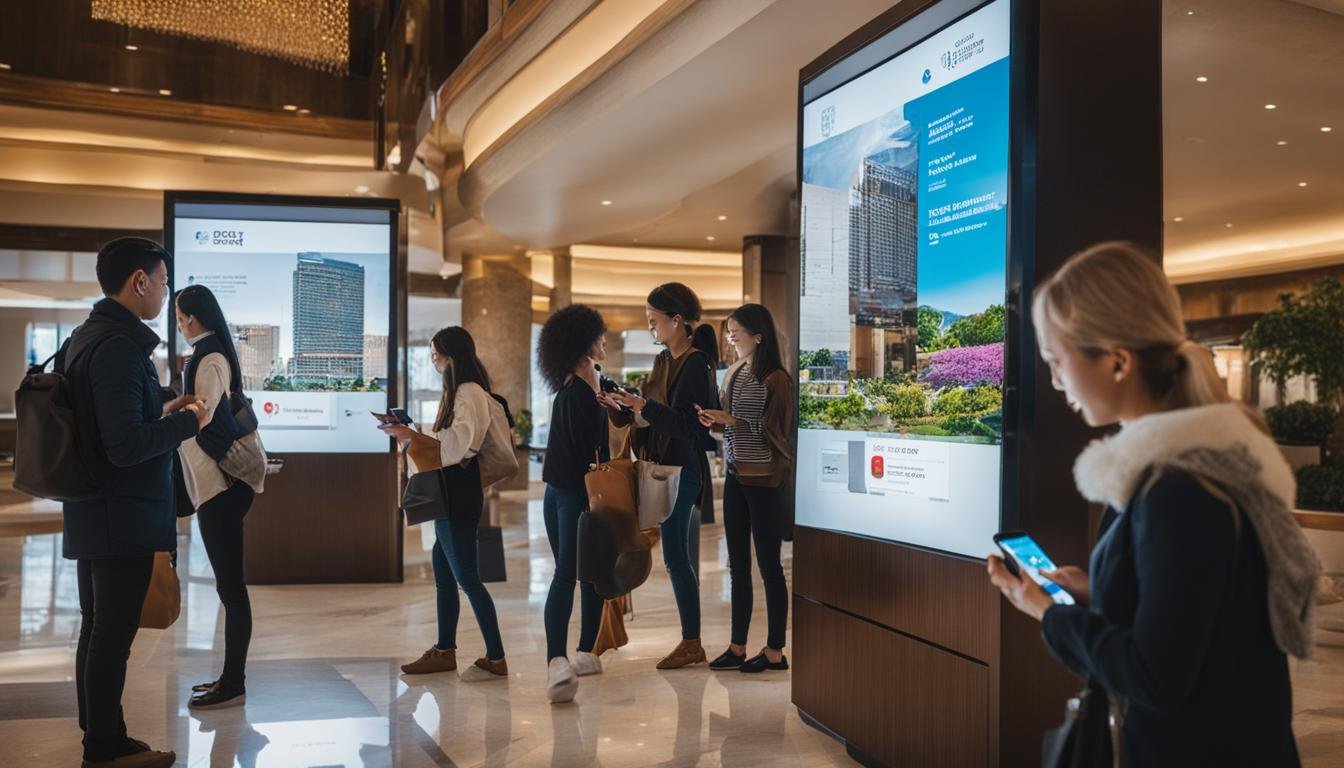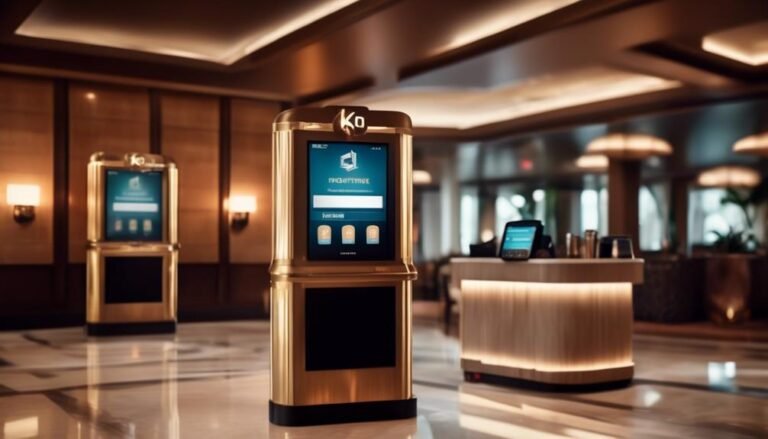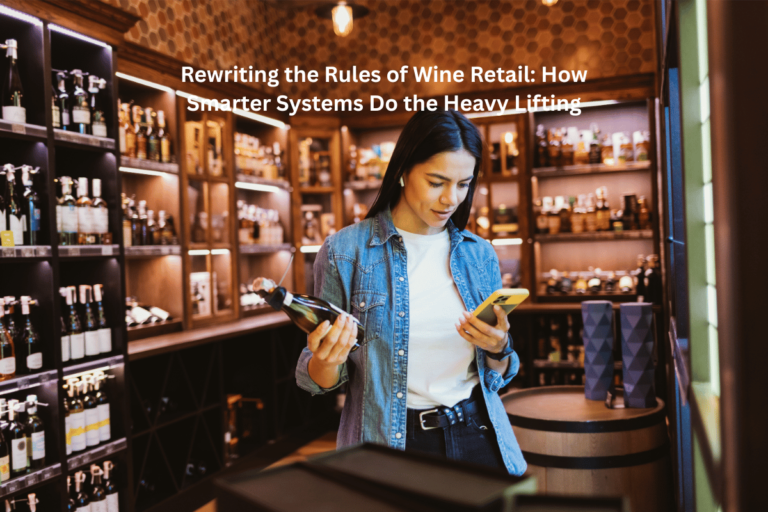Enhancing Guest Engagement with Digital Solutions
Guest engagement is a vital aspect of the hospitality industry. To improve guest experiences and increase guest satisfaction, businesses are embracing digital solutions that revolutionize the way they interact with their customers. By leveraging technology, companies can create personalized interactions, offer compelling content, and provide relevant experiences that keep guests engaged and coming back for more.
With the rise of digital engagement, businesses in the hospitality industry are prioritizing areas like web, mobile, and social content enablement, self-service and governance, and ease of access to information. By focusing on these aspects, organizations can enhance guest engagement, deliver personalized experiences, and ultimately improve customer satisfaction.
Key Takeaways:
- Enhancing guest engagement with digital solutions is crucial for the hospitality industry.
- Consistency, compelling content, and contextual relevance are key elements of digital engagement.
- Personalized communication, mobile-friendly content, social media engagement, and self-service options are effective strategies to enhance guest engagement.
- Embracing digital solutions can reshape the way hospitality businesses interact with their guests and deliver exceptional digital experiences.
- Implementing self-service options like chatbots and FAQs can improve guest satisfaction and reduce the need for human assistance.
The Three C’s of Digital Engagement
When it comes to enhancing guest engagement with digital solutions, businesses need to focus on the three C’s: consistency, compelling content, and contextual experiences. These elements play a crucial role in creating a captivating digital environment that keeps guests engaged and satisfied.
The first C is consistency. It is essential for businesses to provide a consistent experience across different devices and access points. Whether guests are using a website, mobile app, or social media platform, they should encounter a seamless and cohesive experience. This consistency builds trust and fosters a sense of familiarity, ultimately leading to increased guest engagement.
The second C is compelling content. Simply having a digital presence is not enough; businesses need to provide content that resonates with their guests. Compelling content can be informative, entertaining, or personalized to each guest’s preferences. By delivering content that captures guests’ attention and adds value to their experience, businesses can create a stronger connection and drive engagement.
The third C is contextual experiences. In today’s digital age, guests expect personalized interactions. By collecting data and leveraging it to provide contextual experiences, businesses can tailor their offerings to match guests’ preferences, interests, and behaviors. Whether it’s a personalized recommendation, a targeted promotion, or a customized message, these contextual experiences make guests feel seen and understood, resulting in higher levels of engagement.
Key Takeaways:
- Consistency, compelling content, and contextual experiences are the three C’s of digital engagement.
- Businesses should strive to provide a consistent experience across different devices and access points.
- Compelling content that resonates with guests is crucial for driving engagement.
- Contextual experiences based on data collection can create personalized interactions and enhance engagement.
| Consistency | Compelling Content | Contextual Experiences |
|---|---|---|
| Deliver a consistent experience across devices and access points. | Create content that captivates and adds value to guests’ experience. | Personalize interactions based on guests’ preferences and behaviors. |
| Builds trust and familiarity. | Strengthens the connection with guests. | Makes guests feel seen and understood. |
| Drives increased guest engagement. | Enhances the overall guest experience. | Leads to higher levels of engagement and satisfaction. |
Building Digital Engagement in the Hospitality Industry
In today’s digital age, building digital engagement in the hospitality industry has become essential for staying competitive and providing exceptional guest experiences. By leveraging the power of digital solutions, businesses can enhance guest engagement, implement personalized strategies, and ultimately improve customer satisfaction. Here, we explore some effective guest engagement strategies and how they can be applied in the hospitality industry.
1. Web Content Enablement
One of the first steps in building digital engagement is to focus on web content enablement. This involves creating a user-friendly website that provides valuable information and an intuitive interface for guests to explore. By optimizing website performance, ensuring fast loading times, and implementing responsive design, businesses can enhance the digital experience and make it easier for guests to engage with their brand.
2. Mobile Optimization
With the increasing use of smartphones and tablets, it is crucial for businesses in the hospitality industry to prioritize mobile optimization. By creating a mobile-friendly website and implementing features like click-to-call and mobile reservations, businesses can provide an engaging mobile experience for guests. This not only improves accessibility but also allows guests to interact with the brand on their terms, leading to higher engagement levels.
3. Personalized Guest Experiences
Personalization is key to building digital engagement in the hospitality industry. By collecting and analyzing guest data, businesses can tailor their offerings and communication to meet individual preferences. This can include personalized recommendations, special offers, and targeted marketing campaigns. The more personalized the experience, the more likely guests are to engage with the brand and become loyal advocates.
By implementing these guest engagement strategies and leveraging digital solutions, businesses in the hospitality industry can enhance the overall guest experience, foster meaningful connections, and ultimately drive customer loyalty. In an increasingly digital world, building digital engagement is not just a competitive advantage, but a necessity for success in the hospitality industry.
Engaging Customers First
When it comes to enhancing guest engagement, the first step is to actively engage with your customers. By reaching out to them and establishing a clear line of communication, you create an environment where customers feel comfortable providing feedback and sharing their experiences. This open line of communication is essential for building strong relationships and improving customer engagement.
Engaging customers first also allows businesses to address their needs effectively. By actively listening to their feedback and understanding their preferences, businesses can tailor their offerings to meet customer expectations. This customer-centric approach not only enhances engagement but also leads to higher customer satisfaction rates.
“Engaging customers first creates a clear line of communication and encourages them to provide feedback and share their experiences.”
It’s important to remember that engaging customers is an ongoing process. Businesses should regularly communicate with their customers through various channels, such as email newsletters, social media updates, and personalized messages. This consistent engagement builds trust and loyalty, ultimately leading to increased customer satisfaction and repeat business.
Benefits of Engaging Customers First:
- Establishes a clear line of communication
- Encourages customers to provide feedback and share experiences
- Allows businesses to address customer needs effectively
- Builds trust and loyalty
- Increases customer satisfaction and repeat business
By engaging customers first and prioritizing their needs, businesses can foster a positive and meaningful relationship with their audience. This not only improves customer engagement but also sets the foundation for long-term success in the hospitality industry.
Personalizing Customer Communications
In today’s digital age, personalization is key to capturing and retaining customer attention. By adopting a customer-centric approach and personalizing customer communications, businesses can create memorable experiences that foster customer loyalty and satisfaction.
One effective way to personalize customer communications is by using customers’ names in emails or updates. This simple gesture can make the experience more personalized and increase the chances of engagement. Additionally, businesses can leverage customer data to tailor their communications to individual preferences and interests. By understanding their customers’ needs, businesses can create targeted and relevant messages that resonate with their audience.
Fostering Meaningful Connections
Personalized customer communications help businesses treat customers as individuals, not just another number. This approach fosters meaningful connections and establishes a strong foundation for long-term relationships.
Furthermore, businesses can utilize dynamic content and segmentation strategies to deliver personalized experiences. By categorizing customer data based on demographics, purchase history, or preferences, businesses can create targeted content that speaks directly to the customers’ interests. This not only increases engagement but also shows customers that their needs and preferences are valued.
Implementing a customer-centric approach to communication can have a significant impact on customer satisfaction and loyalty. When customers feel understood and appreciated, they are more likely to engage with the brand and become loyal advocates. By personalizing customer communications, businesses can build stronger relationships with their customers and enhance the overall customer experience.
| Benefits of Personalized Customer Communications | Examples |
|---|---|
| Increased engagement | Using customers’ names in emails |
| Improved customer satisfaction | Categorizing customers based on preferences |
| Enhanced brand loyalty | Delivering targeted content |
Providing Mobile-Friendly Content
With the increasing reliance on mobile devices in our daily lives, it’s crucial for businesses to prioritize providing mobile-friendly content to enhance guest engagement. Mobile devices have become the preferred method of accessing information, making reservations, and interacting with businesses. Therefore, it’s essential to ensure that your website and digital content are optimized for mobile use to create an engaging mobile experience for your guests.
One of the key advantages of mobile-friendly content is ease of access. When your website is optimized for mobile, guests can easily navigate your site, find the information they need, and take action without any barriers. This seamless experience enhances guest satisfaction and encourages them to further engage with your brand.
Moreover, providing mobile-friendly content enables businesses to deliver an engaging mobile experience. This includes features like responsive web design, fast loading times, intuitive navigation, and interactive elements tailored to mobile devices. By incorporating these elements, you can captivate your audience and keep them interested in what you have to offer.
The Benefits of Mobile-Friendly Content
Mobile-friendly content offers several benefits for businesses. Firstly, it allows for improved search engine visibility. Search engines like Google prioritize mobile-friendly websites in their search results, making it easier for potential guests to find your business. Additionally, a mobile-friendly website enhances your brand image and credibility, as it shows that you prioritize providing a seamless experience for your guests.
Furthermore, mobile-friendly content opens up new opportunities for engagement with your target audience. By leveraging features like click-to-call buttons, mobile reservations, and personalized push notifications, you can actively engage with guests and build a stronger connection. This level of personalization and convenience fosters loyalty and encourages guests to choose your business over your competitors.
Table: Importance of Mobile-Friendly Content
| Benefits | Description |
|---|---|
| Improved Search Engine Visibility | Mobile-friendly websites rank higher in search results, increasing your online visibility. |
| Enhanced Brand Image | A mobile-friendly website showcases your commitment to providing a seamless guest experience, boosting your brand image. |
| Increased Engagement | Mobile-friendly features like click-to-call buttons and push notifications enable direct, personalized engagement with guests. |
| Higher Conversion Rates | A user-friendly mobile experience increases the likelihood of guests completing desired actions, such as making reservations or purchases. |
Overall, providing mobile-friendly content is essential for businesses looking to create an engaging mobile experience, improve guest satisfaction, and drive conversions. By prioritizing mobile optimization, you can ensure that your guests have a seamless, enjoyable experience when interacting with your brand.
Leveraging Social Media Engagement
In today’s digital age, social media has revolutionized the way businesses engage with their customers. It offers a powerful platform for customer interaction, allowing businesses to connect, engage, and build relationships with their target audience. A well-crafted social media strategy can be a game-changer for businesses in the hospitality industry, enabling them to effectively communicate with customers, gain valuable insights, and ultimately enhance customer engagement.
One of the key advantages of social media engagement is the ability to directly interact with customers. Through platforms like Facebook, Twitter, and Instagram, businesses can respond to customer inquiries, address concerns, and provide timely assistance. This direct line of communication not only enhances customer satisfaction but also demonstrates a commitment to customer service.
Furthermore, social media serves as a valuable channel for businesses to showcase their brand identity and share compelling content. By sharing visually engaging images, videos, and stories, businesses can captivate their audience and establish themselves as industry leaders. This, in turn, fosters customer loyalty and encourages customers to actively engage with the brand.
When developing a social media strategy, businesses should focus on creating content that resonates with their target audience and aligns with their brand values. This can include sharing behind-the-scenes glimpses, featuring guest testimonials, or promoting special offers and events. By tailoring content to the preferences and interests of their customers, businesses can foster a sense of community and spark meaningful interactions.
Benefits of Social Media Engagement
Social media engagement offers numerous benefits for businesses in the hospitality industry. Some key advantages include:
- Increased brand visibility: By maintaining an active presence on social media, businesses can reach a wider audience and increase brand awareness.
- Customer insights: Social media platforms provide valuable data and analytics that businesses can use to gain insights into customer preferences, behaviors, and feedback.
- Word-of-mouth marketing: When customers engage with businesses on social media, they often share their experiences with their own networks, effectively becoming brand advocates and generating positive word-of-mouth.
- Real-time updates: Social media allows businesses to provide real-time updates on promotions, events, and news, keeping customers informed and engaged.
In conclusion, leveraging social media engagement is essential for businesses in the hospitality industry looking to enhance customer interaction and build strong customer relationships. By developing a well-rounded social media strategy, businesses can effectively communicate with their target audience, showcase their brand identity, and foster meaningful customer engagement. Social media offers a unique platform for businesses to connect with customers on a personal level and create memorable experiences that drive customer loyalty and satisfaction.
Table: Benefits of Social Media Engagement
| Advantages | Description |
|---|---|
| Increased brand visibility | Reach a wider audience and increase brand awareness |
| Customer insights | Gain valuable data and analytics on customer preferences, behaviors, and feedback |
| Word-of-mouth marketing | Customers sharing positive experiences with their networks, generating brand advocacy |
| Real-time updates | Provide timely information on promotions, events, and news to keep customers informed |
Implementing Self-Service Options
The implementation of self-service options is a key strategy for enhancing guest engagement in the hospitality industry. By providing convenient and efficient self-service solutions such as chatbots and customer support systems, businesses can empower their guests to find answers to their queries and resolve issues on their own, reducing the reliance on human assistance.
Chatbots, for example, are virtual assistants that can handle a wide range of guest inquiries, from room reservations to restaurant recommendations. These intelligent systems use natural language processing to understand and respond to guest queries, providing instant assistance and freeing up staff to focus on more complex tasks. With chatbots, guests can have their questions answered in real-time, at any time, enhancing their overall experience.
Furthermore, self-service options like customer support systems enable guests to find the information they need quickly and easily. By providing a comprehensive knowledge base with frequently asked questions, troubleshooting guides, and helpful resources, businesses can empower guests to resolve common issues independently. This not only saves time and effort for both guests and staff but also promotes a sense of empowerment and self-sufficiency among guests.
Implementing self-service options in the hospitality industry improves operational efficiency, enhances guest experiences, and ultimately increases customer satisfaction. Guests appreciate the convenience and accessibility of self-service solutions, allowing them to get the information or assistance they need instantly. It’s a win-win situation for both guests and businesses.
Table: Comparison of Self-Service Options
| Self-Service Option | Benefits |
|---|---|
| Chatbots | – Instant assistance – Availability 24/7 – Personalized responses – Improved response time |
| Customer Support Systems | – Comprehensive knowledge base – Quick access to information – Empowers guests to resolve issues independently – Saves time and effort for guests and staff |
In conclusion, implementing self-service options such as chatbots and customer support systems is an effective way to enhance guest engagement in the hospitality industry. These self-service solutions provide convenience, efficiency, and accessibility for guests, empowering them to find answers to their questions and resolve issues on their own. By embracing self-service technology, businesses can improve operational efficiency, optimize staff resources, and ultimately deliver exceptional guest experiences.
Conclusion
Enhancing guest engagement with digital solutions is essential for the hospitality industry. By implementing strategies like personalized communication, mobile-friendly content, social media engagement, and self-service options, businesses can significantly improve guest experiences, increase guest satisfaction, and strengthen customer relationships. Embracing digital solutions and technology can reshape the way hospitality businesses interact with their guests and deliver exceptional digital experiences.
By prioritizing digital engagement, businesses can create a consistent and compelling experience for guests across various platforms and devices. Providing contextual relevance through personalized communications and tailored experiences further enhances customer engagement and satisfaction. Moreover, optimizing content for mobile devices ensures easy access and a seamless experience, catering to the growing number of mobile users.
Social media platforms offer an excellent opportunity for businesses to engage with their guests, gain valuable insights, and build strong relationships. A well-defined social media strategy and active customer interaction can further enhance guest engagement and create a sense of community.
Implementing self-service options, such as chatbots and comprehensive customer support systems, can streamline guest interactions and provide quick solutions. These self-service tools empower guests while reducing reliance on human assistance, leading to improved customer satisfaction.
Source Links
- https://www.glueup.com/blog/digital-customer-engagement
- https://www.forbes.com/sites/forbesbusinessdevelopmentcouncil/2023/05/04/5-ways-to-build-a-digital-engagement-strategy-to-boost-customer-satisfaction/?sh=266080a16c3c
- https://www2.deloitte.com/us/en/pages/chief-marketing-officer/articles/five-building-blocks-for-enhancing-digital-engagement.html







